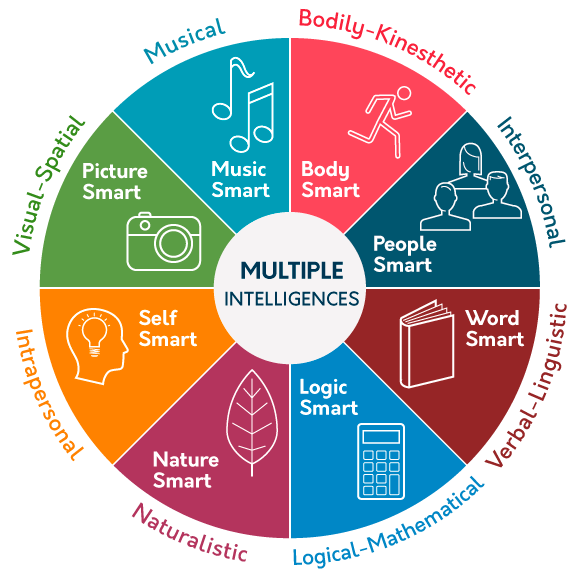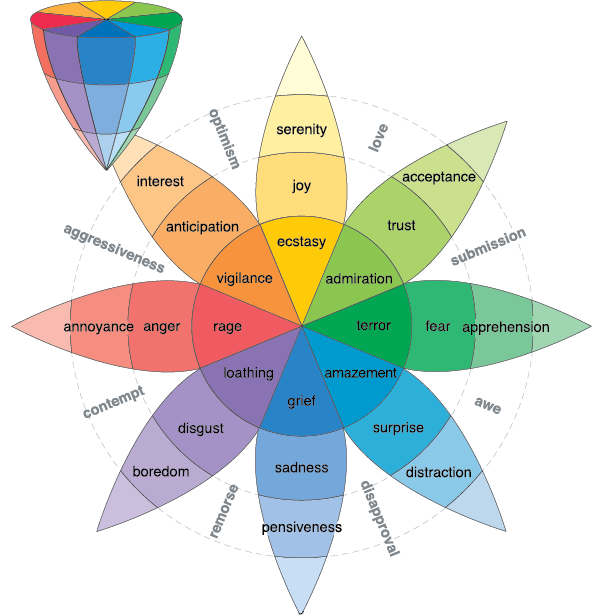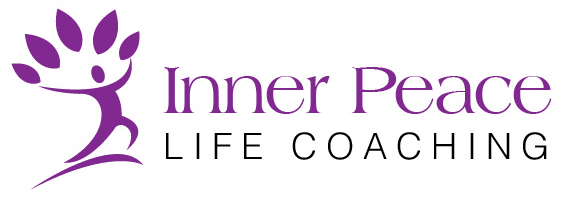Emotional Intelligence or EQ
The complexity of human intelligence is astounding. Researchers have used IQ tests in the modern era to gauge people’s knowledge and the speed at which they can reason through problems. The traditional view of intelligence has always been that people are born with a fixed amount of intelligence, which does not change over a lifetime (Hampton, 2008).
Howard Gardner proposed the Multiple Intelligence theory differentiating human intelligence into specific modalities of intelligence rather than defining intelligence as a single, general ability. (Frames of Mind: The Theory of Multiple Intelligences,1983)
- Musical - Rhythmic and Musical Ability
- Visual - Spatial Intelligence (Psychology)
- Linguistic - Verbal Intelligence
- Logical (Mathematical) - Reasoning Skills
- Bodily (Kinesthetic) - Gross Motor Skills
- Interpersonal - Social Skills
- Intrapersonal - Self Awareness Skills
- Naturalistic - Nature Smart

Pioneers in the field of emotional intelligence, Mayer and Salovey, published their findings in 1990 and defined emotional intelligence as “the subset of social intelligence that involves the ability to monitor one’s own and other’s feelings and emotions,” as well as “the ability to discriminate among them and use this information to influence one’s thinking and actions.” (Hein, 2007)
Later, Daniel Goleman, Ph.D., another important figure in the field of emotional intelligence. Goleman popularized the idea of Emotional Intelligence in Organizations that could be applied in the workplace and schools.
What is Emotional Intelligence?
Emotional intelligence is the ability to understand and manage your own emotions and recognize, influence and impact the emotions of those around you.
Simply you can say emotional intelligence is just being smarter with feelings.

Emotional intelligence is the ability to sense, understand, and effectively apply the power of emotions as a source of human energy, information, connection, and influence.
— Robert K. Cooper
It blends thinking and feeling to make optimal decisions and drive positive results.
In short, EQ is the ability to recognize our and other people’s emotions and use this awareness to become Intentional and purposeful.
EQ is the learnable, measurable, scientifically validated skill set that fuels better effectiveness, relationships, well-being and quality of life – for adults and children.
Empirically Emotional Intelligence deals with 3 aspect:
- Awareness - knowing about yourself and your patterns
- Management - holding back, taking a deep breath, looking at your patterns and figuring out what else you can do
- Direction - finally understanding what really is important to you and making choices that will help you to go in the direction of what is important to you
Why EQ?
The Six Second Model of EQ identifies Eight Competencies and Skills
Enhance Emotional Literacy
Accurately identifying and interpreting both simple and compound feelings.
Recognize Patterns
Acknowledging frequently recurring reactions and behaviors.
Apply Consequential Thinking
Evaluating the costs and benefits of your choices
Navigate Emotions
Assessing, harnessing, and transforming emotions as a strategic resource.
Engage Intrinsic Motivation
Gaining energy from personal values & commitments vs. being driven by external forces.
Exercise Optimism
Taking a proactive perspective of hope and possibility.
Increase Empathy
Recognizing and appropriately responding to others' emotions.
Pursue Noble Goals
Connecting your daily choices with your overarching sense of purpose.
Research shows that the better you are at these EQ competencies, better your Performance will be in terms of Success Factors.
The Six Second Model of EQ identifies four Success Factors that eventually contribute to the Overall Performance.
Why EQ?
Effectiveness
Capacity To Generate Results
Quality Of Life
Capacity to maintain balance and satisfaction
Relationships
Capacity to build and maintain networks
Wellbeing
Capacity to maintain optimal energy and functioning
Overall
Combination of all factors
Did You Know?
Myths about EQ
What are Thoughts, Feelings and Emotions?
Thought consists of our ideas, opinions and beliefs about ourselves, others and the world around us. Stated simply, it’s our mind talking to us. Our thoughts can be productive and productive and just plain neutral. Neuroscience estimates that our brains can produce up to 50000 thoughts on any given day. We gain insight into how we feel and behave when we reflect on our thoughts. This creates a space for us to re-choose and change our thoughts.
Emotions are Chemical reactions that create specific Subjective experiences, Physiology responses and corresponding Behavioral patterns. They are signals that help us to Survive and Thrive. Emotions drive people and People drive Performances.
Emotions are reactions to things that happen around us and we use feeling words to describe them. Emotions serve direct our attention and motivate us. They are information and energy. Each emotion provides a signal for our perception of the world inside and outside, but these signals are not clear signs; instead, they are felt senses.
Check out our Facebook Fan Page to find out more about what signals do the Emotions provide. These are available to the members of the group.
Feelings are experiential. You can literally feel them; ignored is a feeling that might go with the thought above. It might feel like a slap on the face or a punch in the stomach, it’s something you can viscerally experience.

Thoughts have an evaluative component; they assess data and include assumptions about what’s happening. For, e.g., “He’s not Listening to me” is a thought. It’s an assessment of the situation. Thoughts are primarily abstract. They are not something you can physically feel.
Thoughts and feelings are often mixed in our minds, which makes sense because they are literally mixed together in the way they are processed in the brain.
How to Manage Your Emotions?
It is worth mentioning that Emotions will not disappear when you suppress them. Quite the opposite: what you resist persists. In fact, your relationship with your emotions eventually determines their impact on your well-being. I have clients who used suppression of negative emotions focus on optimism and hope without giving a chance for the negative emotions to be felt and expressed. This has resulted in a lot of pain and suppressed anger, frustration in them.
Maintaining, increasing, or decreasing the intensity, length, and/or quality of emotion is how you can Manage your emotions. Our ability to control our own and other people’s emotions is called emotion regulation.
Emotional management produces Conscious actions and reduces emotional reactivity.
Take someone who is experiencing extreme anger as an example. They may act out their anger by fighting or acting aggressively if they are unable to control its intensity.
Similarly, A person experiencing extreme enthusiasm could misjudge the risk and make a snap decision, such as taking a loan or purchasing a new piece of technology, if they are unable to manage the intensity of their feelings.
Our ability to manage our emotions better enables us to deal with the situations we find ourselves in. Long-term well-being and relationship quality can both be improved by having effective emotional management skills.
A thermometer responds to the ambient temperature, but a thermostat controls the ambient temperature. While those who behave like thermostats let external forces decide their emotional state, those who act like thermometers regulate their emotions and, consequently, their feelings and behaviors.
It takes about six seconds before emotion chemicals lose their peak and influence. Therefore, whenever we experience strong emotions for more than six seconds, it implies you are choosing to recreate the feeling over and again. What if you pause? What would happen if you took a deep breath? How would that affect how we are feeling?
Emotional Awareness
You can use emotional awareness to improve your ability to identify your own and other people’s emotions. It allows you to create strategies to manage your emotions and offers you a vocabulary to express them.
Both individuals and Performance are driven by emotions. If we aren’t aware of how we are feeling or how those feelings influence our actions, we are more likely to react instead of consciously responding. Your behavior outside might be significantly affected by how you are feeling on the inside.
Increasing our Emotional Vocabulary (Use our EMO-Meter to learn more about words that describe emotions) is one method to become more self-aware. The clearer you can express emotions, the better you can manage your emotions. People without basic emotional literacy skills frequently find it challenging to manage strong emotions and establish genuine connections with others.

The more precise the words we use to describe our feelings, the more accurate our understanding of how we feel, what is causing it, and what we should do about it.
An interesting tool to enhance our emotional vocabulary is Plutchik’s Wheel of Emotions.
It is not just a 2D view but represents a 3D view of how primary Emotions can create secondary emotions.
Click here to Download – “How to decode Plutchik’s wheel of Emotions?”
Have a look at the Interactive version of Plutchik Wheel here.
How does Emotional Intelligence facilitate Performance?
According to research, those who score above average on EQ are FOURTY THREE TIMES likely to be in the high-performance zone as far as the Success Factors are concerned.
People with emotional intelligence can successfully manage their emotions in ways that help them live their values and accomplish their goals. There are many different strategies to achieve Performance.
Here are four fundamental approaches, Emotionally intelligent people adapt:
Relationship Management
Emotionally intelligent people understand how the expression of their own emotions influences others. Past research findings suggest that expressing emotion can cause other people to experience the same emotion so that the emotion spreads from one person to another.
Emotions can also induce complementary emotions in other people. Thus, emotions can be “used” to influence one’s social environment, and emotionally intelligent people utilize this skill to move toward personal goals.
Focus on Needs and Values
Another way emotionally intelligent people use their emotions to promote goal achievement is by extracting and using motivational information from emotions.
Emotions can be perceived as “data” and, when interpreted correctly, can inform the individual about how well they are living in line with personal values and goals.
For instance, negative emotions like fear inform the individual that something valuable is under threat. In contrast, positive emotions like joy or gratitude may signal that the individual lives in alignment with personal values and goals.
The ability to extract this information from emotions allows the individual to use the emotions as “signals” at the service of his values and goals
Promoting Creativity
Understanding the purpose and effects of both positive and negative emotions is a third way that emotions can be used to help people achieve their goals. Positive emotions broaden thought-action repertoires and promote an upward spiral of positive emotions, just as negative emotions cause narrowing thoughts to concentrate on the details of a problem.
Emotional intelligence is recognizing the advantages of and using joyful emotions. Positive emotions may give the emotionally intelligent person the ability to either devise original solutions to goal-related problems or think of alternate routes to the goal they’re pursuing.
Better Coping Mechanism
A person can overcome setbacks on the path to their goal by creating positive emotions. Emotionally intelligent individuals may possess complex understandings of their positive emotions and use this knowledge to adapt resourcefully in response to negative stimuli”.
Positive emotions can be “used” to speed up the achievement of goals by improving coping mechanisms with obstacles in the way. Emotionally intelligent people make better use of positive emotions to enhance their Performance, whether or not this knowledge is applied consciously.
How is Emotional Intelligence connected to Leadership?
It is a leader’s responsibility to mobilize a group to complete tasks beyond one individual’s scope. Leadership is about enabling them to reach their full potential.
A leader who is aware, genuine, passionate, and acts with integrity will develop trust, commitment, and alignment to support an environment where people can contribute their best work. No magic formula or guideline exists for effective Leadership. Great leaders carve their own paths, ones that are distinctively based on their own abilities and traits.
To lead groups, you cannot adopt a style or a predetermined set of behaviors. Instead, you should conduct a careful self-evaluation to identify your weaknesses and strengths before making any further moves. This will not only provide guidance on how to use your EQ to enhance Leadership but also self-coach you to enhance your EQ.
How to Enhance EQ?
To be fluent in any language, you start with its letters, words, and sentences, then you engage them at a higher level like reading and writing Articles, essays, Poems etc. Similarly, to enhance EQ, you start with
Self-Awareness – This involves the ability to understand one’s deep emotions and to be able to express them naturally.
Awareness about others – This relates to the ability to perceive and understand emotions in other people.
Emotional Regulation is the ability to effectively deal with one’s emotions. A person who has learned this skill will be better than most, preventing emotions from automatically influencing their behavior.
Performance – This relates to the ability to use emotions by directing them toward constructive activities and personal Performance.
Management thinker Peter Drucker is often quoted as saying, “You can’t improve what you don’t measure.” This presented a significant challenge for EQ consultants and coaches worldwide due to the lack of a Precision tool, measurement mechanism, and techniques. Today Inner Peace Life Coaching with Certified EQ Coaches and in collaboration with Six Seconds International have various tools to precisely measure and focus on specific areas that need to be educated, equipped and coached.
Additionally, it is known from research that those with high emotional intelligence are better able to manage daily stress, foster more meaningful close relationships, and have higher levels of social competence in general. (see Zeidner, Matthews, & Roberts, 2009, for a review).
As a result, people with high EQ or emotional intelligence may also be more likely to have “optimal psychological functioning and experience” or higher levels of well-being. (Ryan & Deci, 2001, p. 142).
Emotional Intelligence tools for Individuals and teams available to measure and enhance EQ are
– SEI Individual EQ Assessments
→ SEI Adult Version
▪ Profiles
▪ Brain Brief Profiles – Intro to EQ as processing data
▪ Brain Discovery Profile – Dialogue on key strengths & challenges
▪ Brain Talents Profile – Use unique strengths powered by EQ
▪ EQ Dashboard – Group’s EQ, Talents, and Performance at-a-glance
▪ Reports
▪ Strengths Report
▪ Development Report – Process for using & strengthening EQ in life
▪ Leadership Report – Process for using EQ in business
▪ EQ Neural Net – Personalized AI plan for emotional intelligence enhancement.
▪ Group Development Report
→ SEI Youth Version
▪ Profiles
▪ Brain Brief Profiles
▪ Brain Talents Profile
▪ EQ Dashboard
▪ Perspective Version on Youth Report – Adult’s perspective on a child
▪ Reports
▪ SEI-YV Report – EQ Snapshot for people ages 7-18
▪ SEI-YV Group Report – Group’s Emotional Intelligence Comparison
– Vital Sign Tool Set
▪ Leadership Vital Signs (LVS) – insight into Personal leadership impacts and effectiveness
▪ Teams Vital Signs (TVS) – identifies opportunities and obstacles for optimal group performance.
▪ Organizational Vital Signs (OVS) – measures key indicators of organizational climate across the enterprise.
▪ Educational Vital Signs (EVS) – provides a snapshot of the current school or classroom climate and identifies areas that are supporting and hampering with school success

